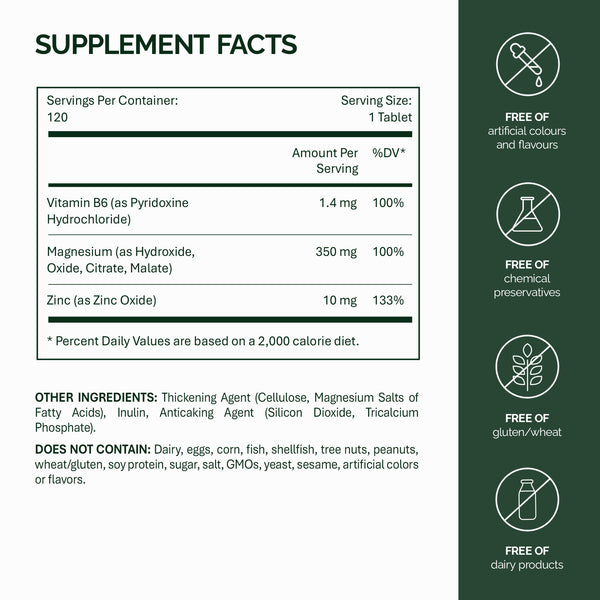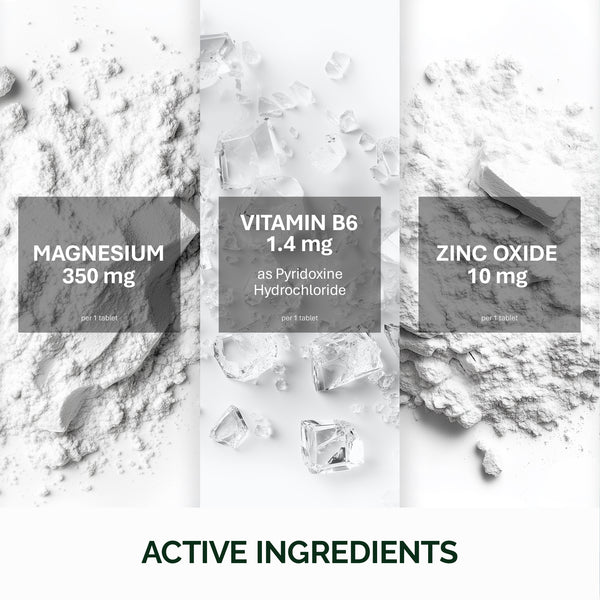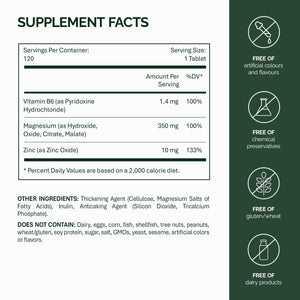
If you have been scrolling wellness TikToks or Pinterest boards, you have probably run into magnesium citrate – sometimes called “Calm” by its most famous brand. Magnesium is an essential mineral our bodies need for everything from muscle and nerve function to keeping bones healthy. Magnesium citrate is simply a magnesium salt (magnesium bound to citric acid) that your body can absorb more easily than some other forms. It often shows up in supplements and even over-the-counter laxatives. In other words, it is a versatile “health hack” – used both to boost your daily magnesium intake and to relieve occasional constipation by drawing water into your gut.
What is magnesium citrate? It is not a designer drug – just magnesium + citric acid. This makes a highly bioavailable supplement: in one trial, magnesium citrate was absorbed significantly better than plain magnesium oxide. That means more of the magnesium actually reaches your cells where it can do its job (relaxing muscles, regulating nerve signals, aiding bone and heart health, etc.). Because magnesium is a key part of over 300 enzymatic processes in the body, getting enough can affect everything from blood sugar to mood.
Benefits of Magnesium Citrate
Magnesium citrate can help in a bunch of ways – both in routine wellness and when you’re literally backed up. Key benefits include:
- Relieves occasional constipation. Magnesium citrate is an osmotic laxative: it pulls water into the intestines, softening stool and helping you have a bowel movement. In fact, doctors often use it for colon cleanses and as a quick fix if you’re really stopped up. (Just remember – it is for occasional use, not a daily remedy!)
- Supports bone and heart health. About 50–60% of your body’s magnesium lives in bone, where it helps activate vitamin D and manage calcium balance. Getting enough magnesium (with citrate or any form) is linked to stronger bones and may also help relax blood vessels. Some studies show that supplementing can slightly lower blood pressure by counteracting calcium’s constricting effect on arteries. In short: magnesium citrate is good for your skeleton and your circulation.
- Eases muscles and cramps. Magnesium is famous for its muscle-soothing effect. It naturally blocks excess calcium from “over-exciting” muscles, which can ease spasms, aches, and post-workout soreness. If you have ever had charley horses or tight calves, magnesium citrate can help relax those muscles. Many people also report that taking magnesium at night helps them relax (more on that below).
- Promotes calm and better sleep. Speaking of relaxation, magnesium has a gentle calming effect on the nervous system. In some studies, people with higher magnesium intake (from food or supplements) reported better sleep quality. Some experts even call it “nature’s chill pill” because it can boost the calming neurotransmitter GABA. So yes, sipping a little lemony magnesium drink before bed might help you catch those zzz’s.
- Uplifts mood. Magnesium also plays a role in brain chemistry. Some clinical trials have found that people taking magnesium supplements (including citrate) noticed improvements in anxiety or depression symptoms. The idea is that a well-funded magnesium “bank account” helps your neurons function normally. Pro tip: Do not rely on it to replace therapy or meds if you have serious depression, but it can be a nice natural booster.
In short, a magnesium citrate supplement can be a win-win: it fills common magnesium gaps in the diet and offers targeted benefits (like easing constipation or cramps) that other forms (like magnesium oxide) might not do as well. As one review put it, magnesium citrate is efficiently absorbed and helps relax muscles, stabilize blood sugar and blood pressure, support sleep, and even ease stress-related symptoms.
Constipation and laxative use
One of the questions we hear often is: “Will magnesium citrate make me poop?” The answer is yes (if that is what you need)! At higher doses, magnesium citrate acts as a saline laxative. It draws water into the bowels and softens the stool, making it easier to go. For example, a typical adult laxative dose might be a full 6.5–10 fluid ounce bottle of magnesium citrate solution (often taken at bedtime), which almost guarantees a bathroom trip in the morning.
However, only use it for occasional relief. It is not meant as a daily poo-pill. If you use it too often, your body can become reliant on it, and you risk dehydration or electrolyte imbalances. Doctors recommend addressing underlying causes of constipation (fiber, water, exercise) rather than staying on laxatives long-term. So yes – have magnesium citrate on hand for a bounce-back fix when you need it, but talk to a healthcare provider if you find yourself needing it regularly.
Forms and supplements
Magnesium citrate supplements come in lots of convenient forms, so you can pick what fits your style:
- Tablets or capsules. These are your classic pills. Each capsule usually delivers about 100–200 mg of elemental magnesium, which makes dosing easy. You can just swallow them with water. Common supplement brands make magnesium citrate pills. One advantage: capsules do not taste like anything and you can take them anywhere.
- Liquid solutions. This is often sold in bottles (like the laxative bottles from brands such as Citrate of Magnesia or Citroma). It is literally magnesium citrate in liquid form. As noted above, a typical dosage is a whole 10-oz bottle, which might have 10+ grams of magnesium citrate. (This is not how you would supplement daily magnesium – it is specifically for a strong laxative effect.)
- Gummies & chewables. Yes, for the gummy-loving crowd: some brands make magnesium citrate in gummy form. These are tasty and easier to take (no big pills!), but watch the sugar content and be aware gummies often have lower magnesium per piece (like 50–100 mg each). You might need several to equal one tablet dose.
Whichever form you pick, check the label for elemental magnesium content (the mg of actual magnesium, not the total weight of the salt). Also look for quality marks (USP, NSF, etc.) whenever possible.
Dosage and best time to take It
Daily needs: The National Institutes of Health sets recommended magnesium intakes around 310–320 mg/day for adult women and 400–420 mg/day for adult men. Pregnancy bumps the RDA slightly (to ~350–360 mg/day). These totals include all sources (food + supplement). Because many folks do not hit those numbers with diet alone (look at nuts, greens, whole grains – not always in every meal), a magnesium supplement can help you meet your needs.
Supplement dose: Most magnesium citrate supplements give 100–200 mg per pill or serving. To reach, say, 300 mg, you might take two tablets. If you take more (up to the RDA), do it in divided doses or with a meal to improve comfort. For example, a typical routine might be “one 100 mg capsule with breakfast and one with dinner.”
Laxative dose: If you are using it to relieve constipation (not just supplement), follow label instructions. Adults often take 6.5–10 fluid ounces of the liquid solution in 24 hours (sometimes split into two doses). In powder form, people might take 1–2 teaspoons (scoops) as directed. Always read the bottle – these doses are much higher than what you’d use for daily magnesium, so stick to medical guidance.
Upper limit: Note that the tolerable upper intake level (UL) for supplemental magnesium (in healthy people) is 350 mg/day. That limit exists because higher doses often cause diarrhea and cramps. Sticking close to or below that is wise unless a doctor advises higher (e.g. under medical supervision for a specific condition).
When to take it: Good news – magnesium citrate can be taken with or without food, any time of day. There is no strict “magic hour.” However, some strategies can make it work better for you:
- Nighttime for sleep. Many people take magnesium at night because it may promote relaxation and sleep. If you struggle to unwind after a long day, try your magnesium supplement about an hour before bed.
- Consistency. If you are using it as a daily supplement (for general health), pick a time you will remember – breakfast, dinner, or bedtime. Consistency helps you build the habit and the benefit.
- With water. Always swallow capsules or tablets with a full glass of water. This helps absorption and minimizes stomach upset. Even powder mixes should be dissolved in plenty of water.
- With or without food? You can take magnesium citrate on an empty stomach, but if you find it causes mild upset, try taking it right after a meal. Food often blunts any tummy troubles.
- Drug interactions: Magnesium can interfere with absorption of certain meds (notably some antibiotics and osteoporosis drugs). If you take such medications, give a 2–4 hour gap between them and your magnesium supplement. And if you are on prescription meds (like blood pressure pills, thyroid meds, etc.), mention magnesium to your doctor just to be safe.
Side effects and safety
Like any supplement, magnesium citrate can cause side effects, especially if you go overboard. The most common ones are GI-related: abdominal cramping, gas, nausea, and diarrhea. This is because excess magnesium pulls water into the bowel (again, its laxative action). In fact, loose stools or diarrhea are expected if your dose is too high.
Usually these side effects are mild and go away if you cut back on the dose. Drink plenty of water if you do get loose stools, to prevent dehydration. If you experience severe symptoms like heart palpitations, chest pain, very low blood pressure, or confusion, stop taking it and seek medical attention – extremely high magnesium levels (rare from supplements alone) can cause dangerous symptoms.
Other possible side effects include flushing or sweating and lightheadedness. Magnesium can also affect how you absorb nutrients and medications: for example, it can decrease absorption of iron or certain antibiotics. So as mentioned, space it out from other pills and tell your doc about all your supplements.
Pregnancy and Magnesium Citrate
Hey, moms (and moms-to-be) – you asked about pregnancy, and the news is mostly positive. Pregnancy actually increases your magnesium needs (usually around 350–400 mg per day vs ~300 mg for non-pregnant women). The good news is that moderate magnesium supplementation is generally considered safe during pregnancy. In fact, healthcare providers often encourage getting enough magnesium through diet or supplements for both mom and baby. Magnesium citrate, specifically, is listed by Mayo Clinic as one of the laxatives that are OK to use during pregnancy if constipation strikes. (Other safe options include fiber supplements and milk of magnesia.)
Potential pregnancy benefits of magnesium include prevention of leg cramps and pregnancy-related high blood pressure (preeclampsia). One study even showed that 360 mg of magnesium citrate daily helped reduce leg cramps in pregnant women. It’s also thought to give baby’s brain and muscles a “good start,” potentially lowering the risk of complications in preterm labor (that is why hospitals sometimes give IV magnesium sulfate for preeclampsia, though that is a much higher dose).
That said – always run it by your OB. Everyone’s pregnancy is different, and any supplement should be vetted by your doctor or midwife. Keep in mind that the upper limit of supplemental magnesium still applies, and you don’t want to add GI side effects to pregnancy nausea. But in most cases, taking magnesium citrate in recommended amounts is fine and often helpful for the common woes of pregnancy.
Who should avoid Magnesium Citrate?
While magnesium citrate is safe for most people when used properly, there are some groups who should steer clear or use caution:
- Severe kidney disease. Kidneys remove excess magnesium, so if you have advanced kidney problems (kidney failure, dialysis, etc.), magnesium can build up to dangerous levels. Most experts say avoid magnesium supplements if your kidneys do not work well.
- Intestinal blockages or acute bowel issues. If you have a blockage, ileus, or other serious GI condition, do not take magnesium citrate – it can make things worse by drawing in too much water. Also avoid it if you have active rectal bleeding or severe inflammatory bowel disease (ask your doctor first).
- Heart conduction problems. Rare heart rhythm disorders (like heart block) can be aggravated by high magnesium. If you have significant heart disease, check with a cardiologist before adding magnesium.
- Electrolyte imbalances/low sodium diet. If you are on a strict low-salt (sodium) diet or have known electrolyte issues, magnesium citrate can further shift electrolyte balance. MedNewsToday even lists “low-sodium diet” as a reason to avoid it.
- Allergies. True allergy to magnesium salts is extremely rare, but if you have ever had hives or an allergic reaction after taking a supplement, skip it and consult your doctor.
- Medication interactions. As noted, if you take certain meds (antibiotics like ciprofloxacin, thyroid drugs, osteoporosis pills, etc.), magnesium can interfere. Either adjust timing or talk to your doctor about alternatives.
In general, if you have any serious chronic condition (kidney, heart, liver, GI disease), or are on multiple medications, it is wise to check with a healthcare provider before using magnesium citrate supplements. And of course, do not give magnesium citrate laxative doses to small children without medical guidance – pediatric dosing is very different.
Bottom line
Magnesium citrate is a useful supplement for many of us. For young, busy moms and Gen Z health buffs, it is an easy way to boost magnesium levels and help with occasional constipation. It can improve muscle recovery, mood, sleep, and more. But remember: it is a powerful mineral and can cause loose stools if overdone. Stick to recommended doses (around 300–400 mg/day total for most adults, a bit more in pregnancy) and listen to your body. When used sensibly, it’s generally good for you – just do not go overboard. As always, aim to get most nutrients from food (leafy greens, nuts, whole grains, beans, etc.), and use a high-quality, third-party tested supplement when you need a boost.
References
- National Institutes of Health (NIH) – Office of Dietary Supplements. Magnesium Fact Sheet for Health Professionals. Updated 2022. https://ods.od.nih.gov/factsheets/Magnesium-HealthProfessional/
- Mayo Clinic. Pregnancy constipation: Treating for two? 2022. https://www.mayoclinic.org/
- Medical News Today. What to know about magnesium citrate. Updated 2023. https://www.medicalnewstoday.com/
- Cleveland Clinic. Magnesium Citrate Oral Solution. Reviewed 2022. https://my.clevelandclinic.org/
- WebMD. Magnesium Citrate Oral: Uses, Side Effects, Interactions. https://www.webmd.com/
- Healthline. Magnesium Citrate: Benefits, Uses, Side Effects, Dosage, and More. Updated 2023. https://www.healthline.com/
- Harvard Health Publishing. Magnesium: Often overlooked but essential for health. 2021. https://www.health.harvard.edu/
- Verywell Health. Magnesium Citrate: What It Is, Benefits, Side Effects, Dosage. 2023. https://www.verywellhealth.com/
- Drugs.com. Magnesium Citrate Dosage Guide + Max Dose, Adjustments. Updated 2022. https://www.drugs.com/dosage/magnesium-citrate.html
- American Pregnancy Association. Magnesium During Pregnancy. https://americanpregnancy.org/













